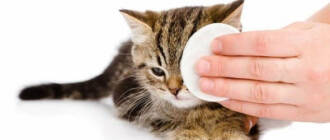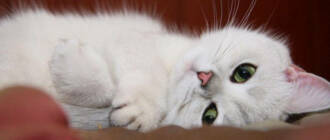Perhaps your cat needs to live in a protected environment with a minimum of stress. A cat that is afraid of strangers, for example, should not be exposed to new guests.

- Cat meows loudly for no reason: why and what to do
- Why do cats meow loudly?
- Meows can also vary slightly depending on the reasons behind them:
- What to do if the cat is awake at night, walking around and meowing
- How not to react to cat meows
- Why a cat meows for no reason
- Possible health problems
- A cat meows a lot: causes and solutions
- Meowing can also be an alarming symptom
- Negative emotions
- A cat wants to go outside
- Reasons
- 1. Hunger .
- 2. Thirsty
- 3. Environmental Problems.
- Assurance
- Reasons
- A cat meows and can't find its place
- Major Causes
- Feeling lonely and demanding attention
- Reasons
- What can your veterinarian do?
Cat meows loudly for no reason: why and what to do
Some breeds, such as Siamese cats, are naturally noisy, but any cat can meow loudly for a variety of reasons.
While you may find your cat's excessively loud meowing annoying, it could be a sign that your cat is not feeling well.
Pay attention to your cat and what else is going on while she meows. If you can figure out the cause of your cat's loud meowing, you may be able to stop this sonic attack.
Why do cats meow loudly?
In addition to body language, meowing is a cat's primary way of communicating. Meowing can take many forms and be for many different reasons.
Most healthy cats are usually trying to communicate something when they meow. For example, your cat may be trying to tell you that it is hungry, tense, scared, excited, or just wants some of your time and attention.
Meows can also vary slightly depending on the reasons behind them:
Frightened or angry meows tends to be louder than other meows. This meow is sometimes quite intense and frightening and, depending on the source of the cat's fright or anger, is either short-lived or prolonged.
Meows in response to pain can also be loud and are an obvious sign that your cat is in distress. Quite often this type of meow has a low and mournful sound. It may be repeated throughout the day or only when your cat is engaged in a particular activity that causes pain, such as trying to use the litter box.
Hungry meowing is usually accompanied by excitement. If your cat hears a treat bag crunching, a can opener buzzing, or food bowls clinking, she may come running in and start meowing with excitement. On the other hand, if your cat knows it's time to eat and you are distracted by something else, the reminiscent meow probably gets louder by the minute.
An attention-grabbing meow – is a sign that your cat may want to play with you or cuddle. For example, your cat may get excited and meow loudly when you come home from work.
Many cat owners are also familiar with nocturnal meowing. . If your cat is nocturnal, it may meow loudly when you are trying to go to sleep to get you to play.
What to do if the cat is awake at night, walking around and meowing
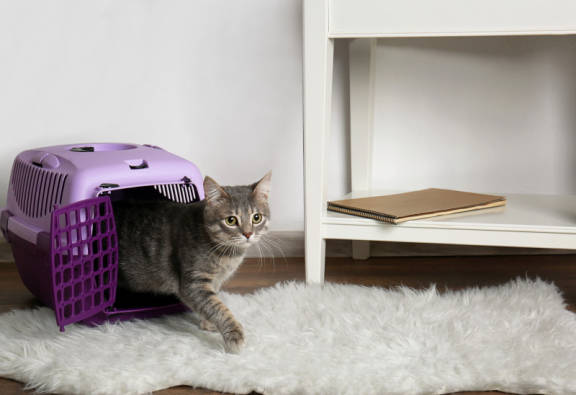
If a cat is running around the apartment, inconveniencing its owner, appropriate action can be taken. Depending on the reasons that provoked the occurrence of nocturnal behavior, the owner's actions may be as follows:
- Help the animal in the adaptation, if the pet began to behave so after moving to a new place;
- Planned sterilization, if the owner has no plans to have offspring from his cat in the future;
- Routine examinations at the veterinarian, general blood and urine tests, and if necessary, an ultrasound to make sure the cat is not ill;
- Clip its claws, which will allow the cat to make less noise during its night run.
You should allow your pet to have as much free time as possible so that the cat does not meow during the night. The cat should be allowed to play with toys and run around until nightfall.
The owner can buy toys for cats in specialized stores or make them on their own.
It is good for a cat to play active games with its owner before going to bed. Depending on the cat's overall activity, the games can be long or short. Playing should be done with the cat until the pet is tired. After playing, you can give the cat a hearty dinner, satisfying the cat's hunting instinct.
How not to react to cat meows
Knowing how to act, you shouldn't forget what not to do. When the cat is active, meows loudly and runs around the house, it is forbidden to throw objects at the pet, shout loudly or punish. During the sex drive, veterinary specialists do not recommend giving the cat special hormonal pills or drops that reduce libido. It is better to sterilize, because the use of hormonal agents provokes the development of malignant neoplasms in the reproductive organs.
Cats that live in an apartment and rarely go outdoors should not leave the house unsupervised. Otherwise, it is possible that the cat will be hit by a car.
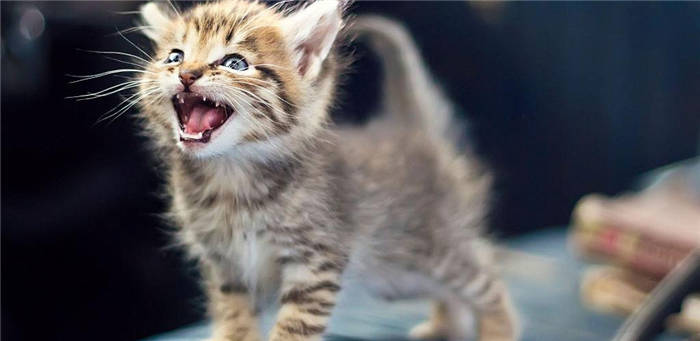
Due to the high volume of questions received, free veterinary consultations have been temporarily suspended.
Why a cat meows for no reason
Stress and fear provoke a cat to meow desperately or loudly. Kittens meow in fear, making pitying sounds in search of their mother. The baby may walk around at night, hide in dark corners, nestle against walls and hide behind sofas, making long sounds.
If a cat meows all the time, the factor provoking such behavior may be a hormonal change. A high-pitched cry indicates that the animal is sexually mature and ready for procreation. A domestic and quiet, beautiful cat suddenly changes its behavior abruptly, rolls on the floor, makes attempts to escape, tucks its tail and meows loudly.
Members of the opposite sex are no less troublesome during the onset of the sexual hunt. Males begin not only to wombly scream, but also mark territorial boundaries.
Prevention of such seasonal changes is achieved only by surgical intervention – spaying. Some owners give their pets hormonal contraceptives to prevent the possibility of procreation. But such drugs, affecting the hormonal balance, have a number of side effects, provoking the further development of malignant neoplasms.
Often cats meow after a meal, indicating that the portion was not enough. If the portion of food was correctly calculated for the cat's age, then there is no need to go on about it and give more. If the cat is really hungry, it will be happy to eat anything. In case a cat is begging for treats with loud cries and does not approach the usual food, you should not encourage such behavior. Cats are excellent manipulators.
Some cats start to meow and walk around the house reminding the owner that it is time to change the litter pellets in the cat's litter box. Loud meowing sometimes indicates that the cat has the door open.
Possible health problems
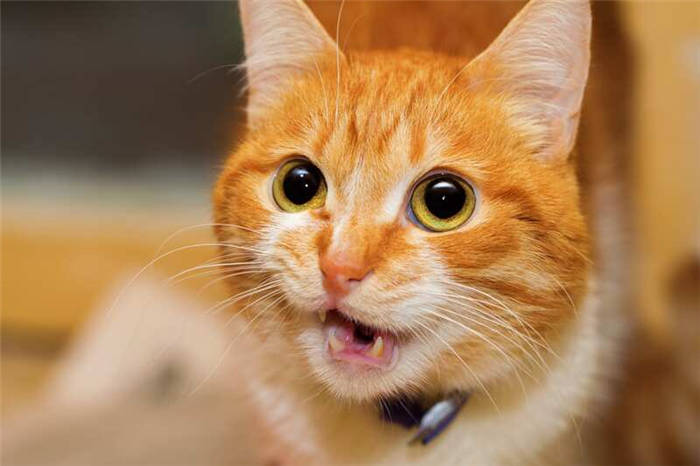
When there are health problems, pets notify the owner with loud, shrill cries. If a cat meows loudly and has characteristic signs of ill health, then in such cases, delaying a visit to the veterinarian is not recommended.
The main health problems accompanied by cat meowing are:
- Problems when going to the toilet – a loud meow from a cat trying to go to the toilet indicates problems with stool (diarrhea or constipation) or diseases of the genitourinary system;
- A combination of symptoms such as eruption of gastric contents, stool distress, attempts to rub the anus against hard rough surfaces with meowing is a sure sign of helminth infections.
- Animal's screaming, combined with the appearance of severe skin itching, bloody scratches on the body and areas of alopecia, points to infection with a hypodermic mite;
- Infectious diseases in the acute stage, characterized by refusal of food, hoarse meow, severe lethargy of the pet.
Degenerative processes in the body of aging animals, lead to abnormalities in the functioning of internal body systems. Older cats are unable to get their bearings, they are unable to stand in one place for long periods of time, so they let out a long meow to ask people for help.
A cat may meow after spaying while coming out of anesthesia. The animal cannot control its body normally, experiences physical discomfort and tries to alert the owner to its condition by screaming. The main task of the cat's owner is to provide proper care and be there for the first time to support the pet. It has also been noted that a cat meows after labor or until the birth process begins. This, too, is a sort of cry for help.
A cat meows a lot: causes and solutions
Animals in the wild produce sounds to communicate with their mates, to find a mate, to call their cubs and to scare away enemies.
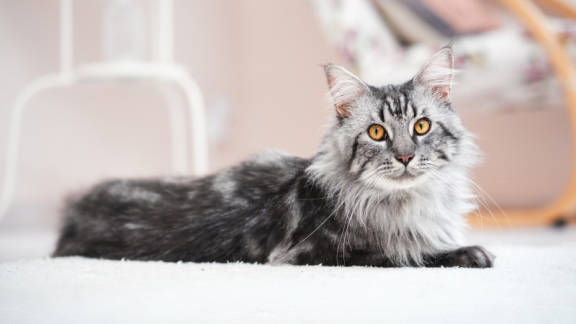
Animals in the wild use their voices to communicate with their mates, find a mate, call for cubs, and scare off enemies.
Domestic animals use their voices to communicate with their owners and to express their emotions, needs, and health conditions.
The range of sounds that cats make is very diverse, from low purring, meowing to high piercing shrieks and hissing.
A cat's "talkativeness" depends on its lifestyle, its emotionality, and how much the owner encourages the cat to produce sounds when communicating. As a result, a stable reaction is formed, which is a reflex and is expressed by certain cat behavior, including the use of the voice, when exposed to various stimuli. For example, when feeding, the cat not only runs to the bowl, licks it, but also meows loudly, which in its understanding accelerates giving food.
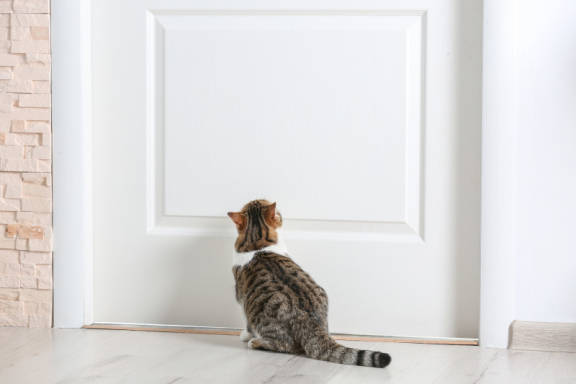
The voice is an additional tool for the cat to draw the owner's attention to itself to satisfy its needs, or to express its attitude toward an event (feeding, petting, communicating, being startled when visiting the vet, etc.). In this case, over time, the domestic cat, in order to get what he wants, for example, food, begins to intensively use sound signals (vocalization), which can be disturbing to the owners. But the more you address and talk to the cat, the more often the cat will "respond" to you.
Vocalizations in animals can be physiological (natural) and pathological, in case of any behavioral or health problems.
Meowing can also be an alarming symptom
High behavioral disorders, excessive shyness or aggressiveness are accompanied by an increase in vocalizations, hisses or low growls. This is how the cat warns of an impending attack, becomes dangerous to others and may cause injury.
Some diseases in cats lead to the fact that the pet begins to meow frequently. For example, cat meowing after going to the toilet may indicate problems with the urinary system. But it also cannot be ruled out that a clean-clean cat asks to clean the litter box after it.
Severe pain, e.g. in injuries in domestic cats, is often accompanied by increased meowing and restlessness of the animal. In older cats, decreased vision and hearing lead to vocalizations as the animal becomes difficult to navigate the room. Other illnesses in the animal may also be accompanied by increased vocalizations of varying degrees.
The main task of the owner is to know the pet's habits and keep a constant eye on it. Pets speak to us with their body language and voice, communicating their needs, fears, or illness. Paying attention to your cat and understanding his motivations will increase his quality of life, reduce his stress and allow him to see a veterinarian in case of illness.
Negative emotions
The seemingly unreasonable meowing of a cat may be related to its desire to communicate its fear, dissatisfaction or irritation. Such emotions in animals are often caused by changes in life. Cats may give a concert when a new family member joins the family, when moving to a new house or during renovations. In these circumstances, the pet will need more attention and affection.
It is well known that closed doors make cats very nervous. They will not stop meowing until they want to be let in or let out. The time gap between conflicting demands can be as little as a minute.
Many cats, especially young and energetic ones, often start meowing if they get bored. So you should make sure that your cat has enough toys of all kinds.
Not all cats like to be petted, petted, picked up or put on their laps all the time. This does not mean that they are not attached to their owners, but due to their breed or character. As a sign of protest such willful and independent pets will cry out and sometimes their meow can be very threatening.
Some cats are sensitive to weather. A change in the weather or an approaching natural disaster causes them anxiety, and sometimes panic. The animals begin to frantically run around the house, meow loudly and longingly, and howl.
A cat wants to go outside
When the sun is shining, when it gets warm, and tantalizing smells from the street penetrate the apartment, house cats take an increased interest in what's going on outside the four walls of their homes. Pets can sit on a window sill for hours, basking and looking at birds, people and animals that pass by. Meowing persistently, they stomp at entrance or balcony doors, hoping at a convenient moment to slip into the gap formed. To stop the cat concert, you can walk the cat on a leash or let it look out the front door and inspect and sniff a small territory. Most often the pet, after satisfying the interest, quickly returns to its safe world and stops meowing for a while.
Another thing is a call of nature. Everybody knows the behavior of unsterilized pets when they are looking for a mate. So under such circumstances, the question of why a cat meows for no reason becomes irrelevant for pet owners. The reason is obvious – the thirst for love and the desire to have offspring. Not being able to satisfy their natural needs, pets meow incessantly, now and then complainingly, now bursting into a yell, trying to escape, endlessly putting tags. Sooner or later the owners have to make a decision – sterilize the animal or let it "go to all the trouble", taking responsibility for the fate of future offspring and the health of the cat.
Reasons
There may be times when you ask yourself: "Why does my cat suddenly meow so much for no reason?" While it may seem like there is no explanation for your cat's meowing, it is rarely done for fun.
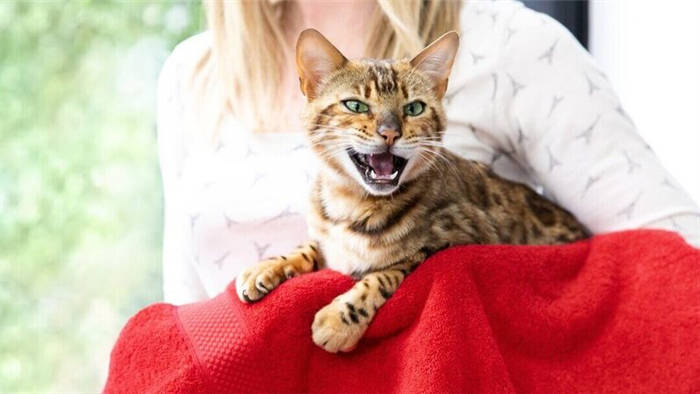
Cats meow to communicate with their owners, so it's up to you to decide if something is wrong or if your cat wants more attention. If your cat meows for no reason, it is probably due to the following reasons:
1. Hunger .
If you notice that your cat is constantly meowing for food, it is either hungry or trying to find a tasty treat. In the latter case, the cat will meow whenever you go to the kitchen or other place where its treats are kept.
On the other hand, you may not be feeding your cat enough. Some cats find that two meals a day is enough to satisfy their hunger, while some prefer small meals served several times throughout the day.
Likewise, if your cat loves its food, it may meow more as its scheduled meal time approaches. This behavior should not be encouraged, so wait until your cat calms down before putting the food bowl down.
Other food-related problems that can cause seemingly random meowing include:
Keep an eye out for any symptoms that may be the real cause of your cat's meowing.
2. Thirsty
Your cat will meow more often if she is thirsty or dehydrated. The most common reason for this is that the cat does not have access to fresh water, or any water at all.
In this case, your cat is alerting you that she needs to hydrate. Meowing is a form of begging. Since cats don't drink water very often, it's not always easy to tell when your cat isn't drinking enough water.
3. Environmental Problems.
If your cat's environment is not right, she will respond by meowing. This is the only way to let the cat know that she is not happy. Some environmental problems can cause a cat to meow for obvious reasons, including:
Assurance
Some older cats meow because they need to reassure their owners. If you pet the cat in return, it will meow more to get your attention. Older cats are more likely to do this because their senses are impaired. Cats with health problems may also feel psychologically better when their owners are around.
There is almost always a reason for your cat's incessant meowing, even if you don't realize what it is. Health conditions, injuries, or deteriorating feelings are all likely explanations. But before you think of a worst-case scenario, check your cat's environment and eliminate any stressors that may be causing her discontent.
Article author: Richard Parker
I'm Richard, and I have experience in all things related to cat health, behavior, grooming techniques, and general pet care. Richard received his degree in journalism in 2008. He is the happy owner of 5 adult cats (all foster stray breeds), including an older cat who is now 20 years old.
Reasons
Many things can cause anxiety in a cat (colloquially, a cat can't find its place), including:
Any illness or painful physical condition can affect a cat not finding his or her place or exacerbate pre-existing ones.
Aging-related changes in the nervous system, infectious diseases and toxic conditions (such as lead poisoning) can lead to behavioral problems, including fears, phobias and anxiety.
Remember, an experience that didn't seem traumatic to you may have seemed very traumatic to your cat – all that matters is that your cat found it traumatic, whether you think about it or not.
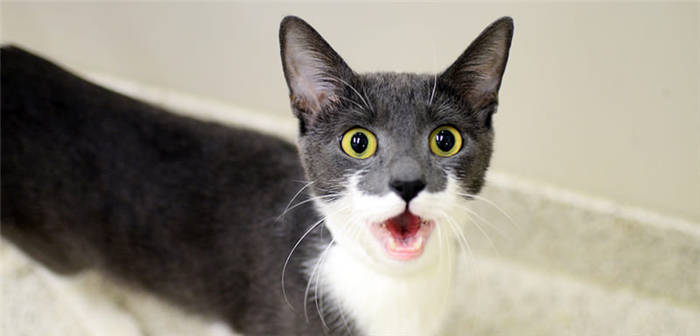
- Improper socialization.
Cats that are deprived of positive social and environmental influences during the socialization period (7 to 12 weeks) can exhibit a variety of behavioral problems, including not finding their place.
Feline anxiety and phobias can form when your cat can't run away or get away from an irritant, such as during a fireworks display or living with a pet that scares it.
Separation anxiety is a common specific anxiety in pets, accounting for 10-20% of referrals to veterinary behaviorists. If a cat has separation anxiety, it means that when it is alone, it exhibits anxious or excessively stressful behavior.
Separation anxiety in cats can be caused by relocation, growing up in a home where people are home most of the time, having only one family member, and fear of noise. Being abandoned or relocated because of fear of separation can make the situation worse.
A cat meows and can't find its place
When something is wrong with your cat, she will cry and meow. This usually indicates that your cat is in distress, confusion, fear, or pain. If your cat starts to hiss more at night, it may be due to cognitive dysfunction.
If they start hissing or growling more, it is due to pain or fear. Some cats may also make noises before vomiting a lump of fur, while eating, or during other regular activities.
If your cat is normally quiet, but starts meowing more often and can't find their way around, they may be trying to send you a message that they are in pain. They may also go deaf. If you can't determine the cause of your cat's sudden noises, see your veterinarian immediately.
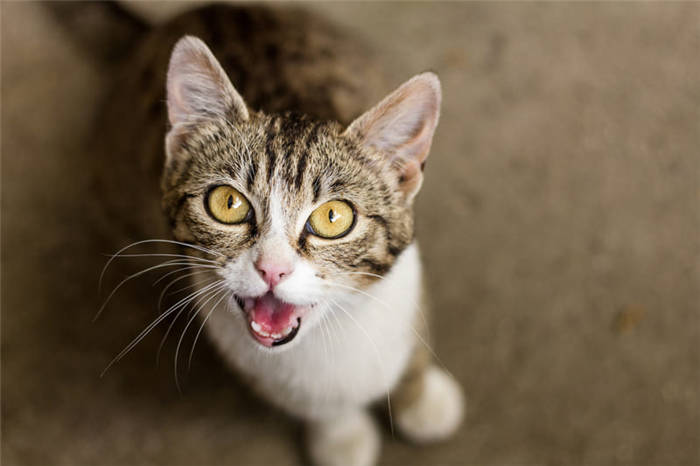
Major Causes
This is probably the most common cause of a kitten's constant "crying". You should not wean a baby from its mother before 2 – 2.5 months of age. At this age, kittens are already able to survive the separation quite painlessly. But at a younger age, the kitten will be very nervous and will be looking for its mother, who was always near and protected it. In this case, you need to help the baby, to calm him down. Take him in your arms, warm him, caress him, talk to him. When the little pet calms down, it will stop "crying". But this behavior will not change the first time. In the morning, when the kitten wakes up, she will start worrying again. The bouts of longing can start at any time of the day. Then the baby will start calling for his mom again and looking for her. Just be there and comfort the kitten, and gradually the situation will improve, and the pet will get used to the absence of the cat, and will treat you as an "older cat".
A change of scenery is difficult for pets to tolerate. It causes a lot of stress, anxiety, and worry. Even if the kitten has stopped pining for the cat and got used to its absence, everything around him is new, unfamiliar. An unfamiliar home, unfamiliar surroundings, new people and maybe other pets. Even an ordinary change of living space can cause stress in a kitten. The baby becomes anxious, fearful, worried, and, as a consequence, begins to "cry". The solution is obvious – it is necessary to show increased attention to him, to calm him down, to surround him with care, and then the meow will stop, the little pet will stop "crying" and start to play.
Feeling lonely and demanding attention
The cause of an incomprehensible meow may also be a feeling of loneliness. When the baby is small, he is not yet so independent, he wants a partner to play with, a friend. He is simply bored by himself. A kitten may call for the master to pay attention to him. The solution in this case is also simple – give the little pet time and attention, while the kitten is small, he really needs your attention, if he is alone, he will start to feel sad. It does not mean that you have to constantly take care of the baby, just give him some time regularly. With age, this problem will pass by itself.
Of course, we are not talking about testing the owner's stress tolerance, but about the little pet's attempt to find out who's in charge in the house. Cats are pack animals, hence they must have a leader. Checking the master by meowing is just the cat's attempt to find out who is the leader here, him or the master. Sometimes it happens that the kitten makes noises under a closed door, but when you open it, he won't even think about coming in. This is a kind of test whether you comply with its request or not. The solution to this problem is obvious: you must explain to the cat who is the "main cat" in the house. Encourage the cat morally, look it straight in the eye and show it that you are the boss. When the baby learns this, he will stop testing you.
Reasons
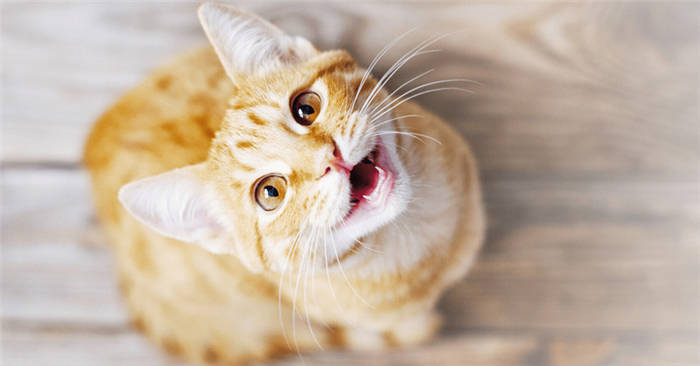
- Decreased sensitivity. Cats that lose their sight, hearing, or sense of smell may begin to yell excessively. Common sense suggests that decreased senses lead to confusion and irritability. My 20-year-old howling cat reminded me of my dad when his hearing aid batteries ran out. "Dad, you don't have to yell at me. I can hear you."
- Hypertension. High blood pressure, by itself or in combination with other conditions, is common in older cats. Some of these cats scream.
- Hyperthyroidism. Very often in older cats, hyperthyroidism can cause excessive vocalization. Is this cat hungry? Hyperactive? Anxious? All of the above? These can be corrected.
- Pain. This often requires a diagnostic hunt and a kind of guesswork, but cats suffering from chronic pain may have periods during the day and night when they make noises. Many older cats suffer from serious dental disease, arthritis, gastrointestinal pain, UTI pain and neurological pain, to name a few.
- Central nervous system disease. Cats can get brain tumors. The most common tumor is a meningioma, which can grow slowly and cause behavioral and neurological changes as well as excessive vocalization.
- Cognitive Dysfunction.. Although we think dogs are more likely to have Alzheimer's, some older cats show signs of dementia and confusion.
- Stress. It's pretty rare, but the fact that an older cat yells can be a sign of stress. You don't want to put your old cat under stress, even after all you've been through together! A new pet, especially a new cat, can be the cause of the screaming. Make sure the cat is as comfortable as possible and that she is not stressed.
What can your veterinarian do?
They will carefully examine your senior cat and determine the source of the howling. If there is an illness or ailment, they may prescribe medications for the illness.
These medications may eliminate the symptoms, while the disease will never go away. Hyperthyroidism can be treated with medication.
In some cases, your cat may have to go through a long period of treatment. You might consider surgery where there is still hope. Hopefully, you can add a few happy years to your cat's life.


